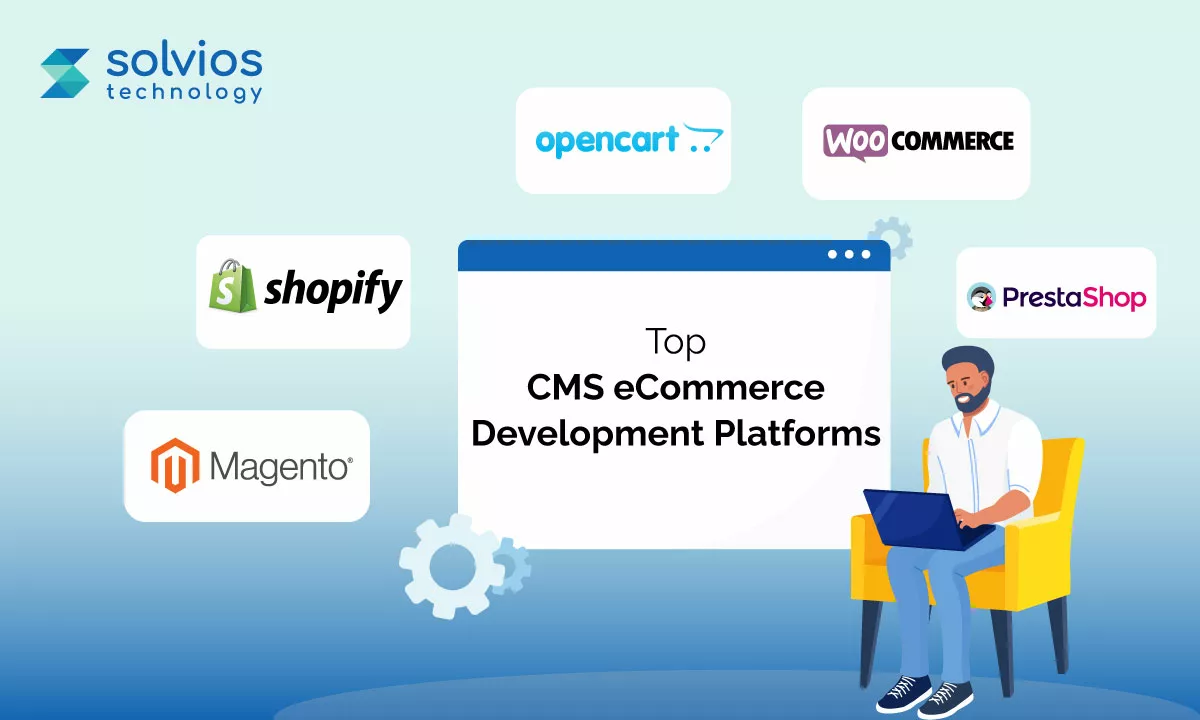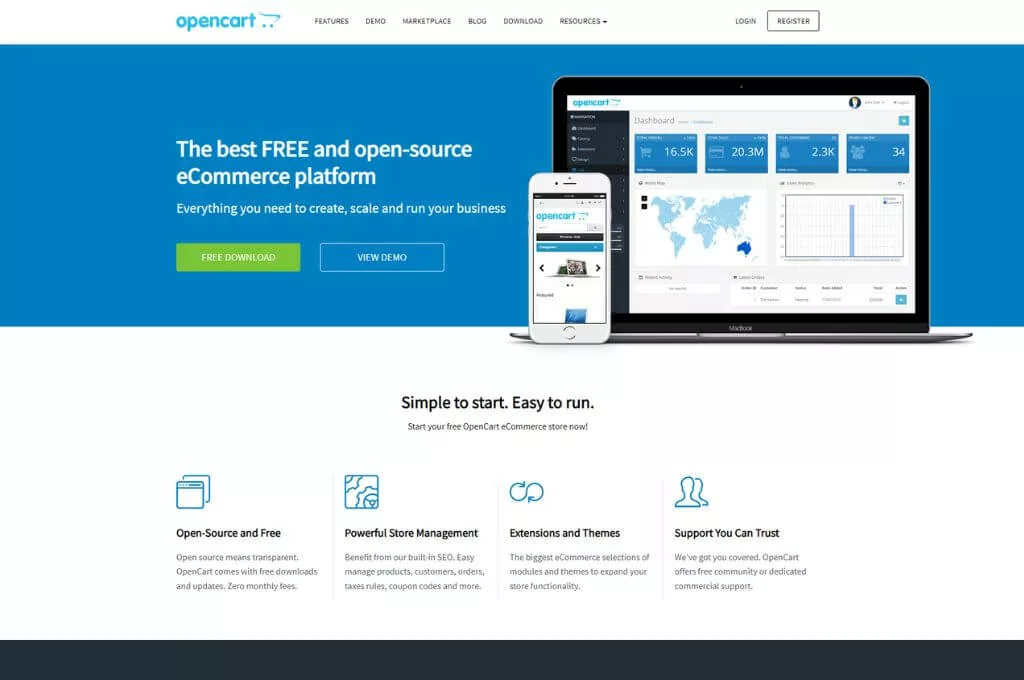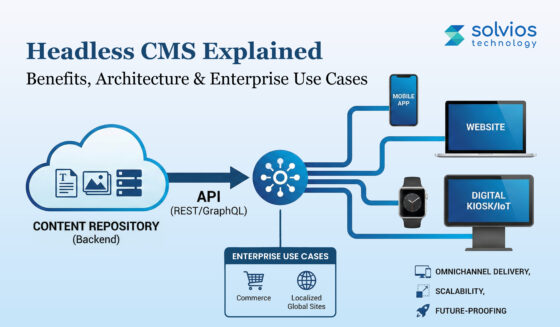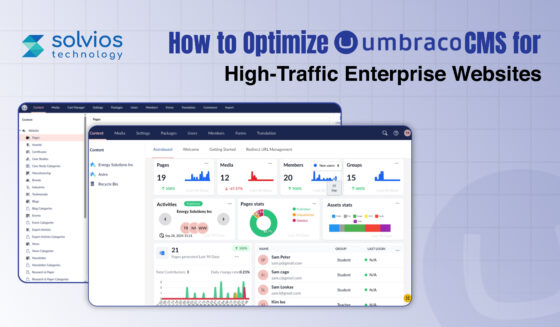
The growth of e-business is expanding more than ever, and it is expected to scale to new heights in the upcoming years.
When building a website, considering CMS eCommerce development is a wise choice. In this article, we are covering the most outstanding Top CMS eCommerce Development Platforms that are considered popular.
What is a Content Management System?
CMS is software that uses a database to manage content and is used to develop websites. The essential responsibilities of CMS are to deal with the age and changing nature of advanced content. The framework enables storekeepers to easily place and manage the substance. The advanced substance incorporates pictures, recordings, archives, promotional materials, and so on.
Best eCommerce CMS Development Platform for Online Stores
Shopify

Shopify is an adaptable internet business platform with tonnes of feature highlights. As indicated by the Shopify report, nearly 800,000 organizations overall utilize the Shopify platform. This astounding figure was more than 41.1 billion complete gross products for Shopify in 2018.
Shopify is viewed as an across-the-board eCommerce platform. Little dealers can set up their web-based stores, deal with their items, and handle all orders from a solitary dashboard. Free integration with eBay and Amazon without custom codes is a striking benefit of Shopify. Store owners easily attract positive customers and increase sales.
Pros
- Shopify is regarded as one of the simplest stages to integrate for eCommerce businesses.
- Give a few delightful, proficient, and versatile subjects.
- Engage clients with numerous applications covering a wide scope of angles, including advertising, bookkeeping, stock administration, transportation, delivery, and then some.
- Shopify provides assistance on a daily basis.
Cons
- Compared to other self-hosted platforms, Shopify isn’t sufficiently adaptable to offer greater usefulness for your store.
- Numerous Shopify themes request payments You could require a specialist’s assistance to get broad subject customization.
- Support through the telephone is only available for the US, UK, New Zealand, and Australia.
- The Highlighted Mobile Pages (AMP) feature is useful, but it is only available in a paid application.
Magento

Magento is well known as the main open-source CMS eCommerce Development Platforms. The framework is created in PHP and empowers storekeepers to construct their web-based organizations easily. The stage supports all business sizes and addresses B2B, Omnichannel, Mobile Commerce, and other business issues. Furthermore, Magento enables collaboration with various third-party augmentations, resulting in unmistakable advanced retail experiences.
Magento manages more than $100 billion in gross product volume worldwide each year. Magento has created a thriving community with over 300,000 Magento developers worldwide. Moreover, it offers the huge Magento Marketplace, where numerous extensions are accessible for download. Assuming you own a web-based shop that sells well, Magento is doubtless worth looking at.
Features
- CMS eCommerce web developers can use a simple drag-and-drop solution.
- Customize content and advancements.
- It is simple to motivate commitment and deals with relevant item proposals.
- Create a unique shopping experience for your customers.
- Simple to make, review, and timetable substance.
- Oversee stores through an instinctive and easy-to-understand interface.
- Utilize work on topics that are responsive and SEO-updated for any device.
- Incorporate with B2B usefulness.
- Update and oversee information from different sources in a single spot.
- Support multi-channel showcasing.
- savvy stock administration and executive requests.
Pros
- Magento is a strong and highlight-rich stage.
- Magento is SEO-friendly and quick to stack.
- Almost every feature of a Magento store can be customized by customers.
- Storekeepers can get all data, including requests, clients, and items, with many progressed detailing highlights.
- Magento offers answers to scale with clients’ organizations.
- Magento has a major local area with 360,000 gathering individuals. You can get advice, FAQs, reports, or anything fundamental to get to this stage.
Cons
- Magento is complicated, so it’s very hard for non-specialized individuals to utilize.
- Magento’s arrangements are costly compared with other stages.
- Magento websites require hosting.
WooCommerce

WooCommerce is one of the major CMS eCommerce Development Platforms today. According to Barn2.co.uk, WooCommerce’s piece of the pie in 2021 will be 22% of the top 1 million sites utilizing eCommerce advancements. The outcome shows the enormous development of WooCommerce lately.
WooCommerce supports turning a WordPress site into an e-store. The stage has drawn in countless clients as it offers various augmentations and topics for free. The eminent benefit of these modules is that they can add different highlights to the fundamentals of WooCommerce in a single snap. Likewise, you are allowed to get support from WordPress’ huge local client base.
Pros
- Provide a plethora of free features to the essential WooCommerce programming.
- WooCommerce is a free WordPress module.
- In contrast to other complex CMS arrangements, WooCommerce is straightforward and simple to use.
- Simple to tweak subjects.
- WooCommerce sites work quickly with the fundamental elements required at a particular time.
- Provide a massive number of expansions.
- full control of the substance.
Cons
- Demand from the store administrator exhaustive information about both WordPress and WooCommerce.
- The establishment of certain expansions isn’t free.
- Clients need to pay for facilitation and space alone.
- The WooCommerce module occasionally fails to adapt to WordPress updates.
- The stage just works with WordPress subjects.
Why Does Your Business Need a
Learn MoreOpenCart

OpenCart is notable in light of its open-source and simple-to-utilize eCommerce stage. It is superfluous to pour an enormous measure of cash into your new store. Additionally, OpenCart brings local e-businesses a helpful and adaptable module without month-to-month expenses. All you need to do is introduce yourself, select a layout, and begin adding items.
OpenCart offers north of 14,000 extensions and subjects to e-organizations of any size. Also, it incorporates in excess of 20 payment gateways and about eight transportation techniques. To put it simply, with a little financial planning, your store can thrive with the OpenCart platform.
Pros
- OpenCart 3.0.3.3 is free.
- An ideal choice for clients who need explicit shopping basket functionalities.
- Adaptable to working with different payment processors and gateways.
- Another straightforward shopping basket site is simple and quick to set up and arrange.
- easy-to-understand organization for the non-educated.
Cons
- The OpenCart report isn’t the simplest when compared with different stages.
- OpenCart’s discount functionality isn’t adequate.
- The stage is very buggy, and security is needed.
- Not an optimal decision for bigger eCommerce stores; obsolete topics and layouts.
- Some engineering ability is required in some cases as an administrator.
PretaShop

PrestaShop is a freemium, open-source eCommerce solution for online dealers. As indicated by the PrestaShop measurement, more than 300,000 e-organizations overall utilize its innovations. The stage is commonly used because stores can easily introduce and tweak the product. You are allowed to choose a completely facilitated or self-facilitated adaptation. Subsequently, you can decide your degree of specialized control.
Aside from PrestaShop’s inherent usefulness, entrepreneurs can broaden the stage by utilizing modules and topics. Notwithstanding, PrestaShop comprises all stores’ needs; subsequently, equipping any extra extensions isn’t fundamental. With the intent to foster top-notch eCommerce programming through open-source advancement, PrestaShop is an optimal stage for you to make business progress.
Pros
- Simple to introduce and design.
- PrestaShop is open-source. It is allowed to shop trucks.
- PrestaShop’s plan is easy to understand for non-specialized clients.
- It is simple to tweak the highlights.
- Support got strong, and dependable installment passages like Paypal and Google Checkout.
Cons
- PrestaShop is reasonable for small and medium stores because of its restricted versatility.
- PrestaShop has no authority behind the help group, only their accomplices.
- The plan of PrestaShop isn’t great for an enormously scoped store.
- Addons are costly pieces.
Final Words
To make your eCommerce business grow at scale, your online stores need to focus on performance in the extreme marketplace environment. The above-mentioned eCommerce CMS will help you find the most suitable platform. It’s hard to say which CMS eCommerce Development Platforms is most compatible with your business. Your business needs will determine which platform you would like to consider based on the pros and cons. Just make the right decision that can be a firm foundation for your eCommerce store and help you achieve business goals.
In case you are looking for eCommerce development services to build your online store, we at Solvios Technology are a custom CMS development company that offers robust CMS solutions.
Lets to Discuss Your CMS eCommerce
Contact Us
Tags
Related Blog
Want to get started with App Development?
These applications are acquiring enormous prevalence by offering hands-on enterprise mobility solutions for organizations around the globe.
Start A ConversationLatest Blogs
Our Partnerships






















